OBD2 fuel saver devices that don’t work share common red flags, so let’s see how EcoChip does.
You probably saw an ad for the EcoChip OBD2 fuel saver recently, googled if it actually works, and came across my blog post. EcoChip ads might even be on this blog post!
As someone whose come across dozens of these fuel saver devices online, which, more often than not, are later proved to not work at all, there are a handful of telltale red flags they all have in common.
OBD2 fuel savers are often advertised on fairly new websites, make dubious claims which they provide no evidence, often use the same style of OBD2 case, and are backed up by questionable reviews on Google.
Let’s see how the EcoChip fares.
How new is the EcoChip OBD2 fuel saver?
Since the EcoChip only sells to customers online, it’s fairly easy to see when GetEcoChip.com was registered.
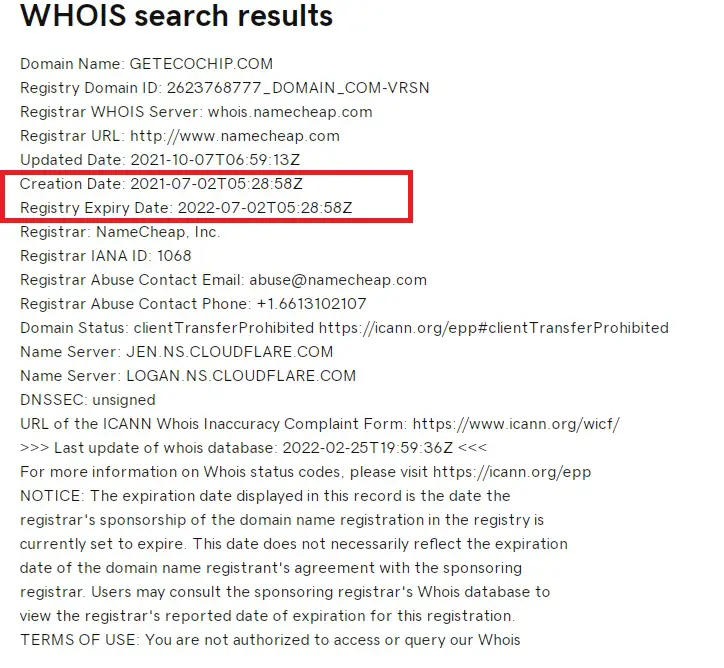
According to GoDaddy.com’s WhoIs lookup we can see GetEcoChip.com was created on July 2, 2021, domain registered via NameCheap.com and set to expire one year later.
Typically, legitimate companies have budgets where they buy and register their domain for at least five years. Clearly, whoever registered GetEcoChip.Com has reservations registering his game changing fuel saving devices for longer than 12 months.
What kind of claims does EcoChip make?
Compared to other OBD2 Fuel Saver devices, EcoChip is fairly tame and doesn’t make outrageous claims.
- Increase horsepower and torque.
- Save money at the pump to reduce fuel consumption.
That’s it.
There’s a simple reason OBD2 fuel saving device companies, as of late, don’t make definitive claims with numbers. The Federal Trade Commission furiously goes after people who sell bogus fuel saving products. In 2006 , the FTC sued makers of FuelMAX and Super FUEL MAX products $4.2 Million for claiming their products would “increase gas mileage by 27% and etc.”
EcoChip claims the OBD2 device works by receiving information from your car’s ECU and adjusting the, “boost pressure, the quantity of fuel, injection timing, and pressure to increase the performance of your car.”
There are actual OBD2 devices that increase power and save fuel using a simple plug-and-play devices, but there is actual documented research and development and dyno charts to back up their claims.
Take, for example, Cobb Tuning, an automobile tuning company based out of Austin,Texas since 1999.
Check out their website here. (Notice how through and professional their site looks compared to EcoChip)
There plug-and-play AccessPort tunes cost between $500-$2000 depending on what car you’re buying it for.
Let’s look at this Cobb Tuning Access Port for a Volkswagen Jetta.
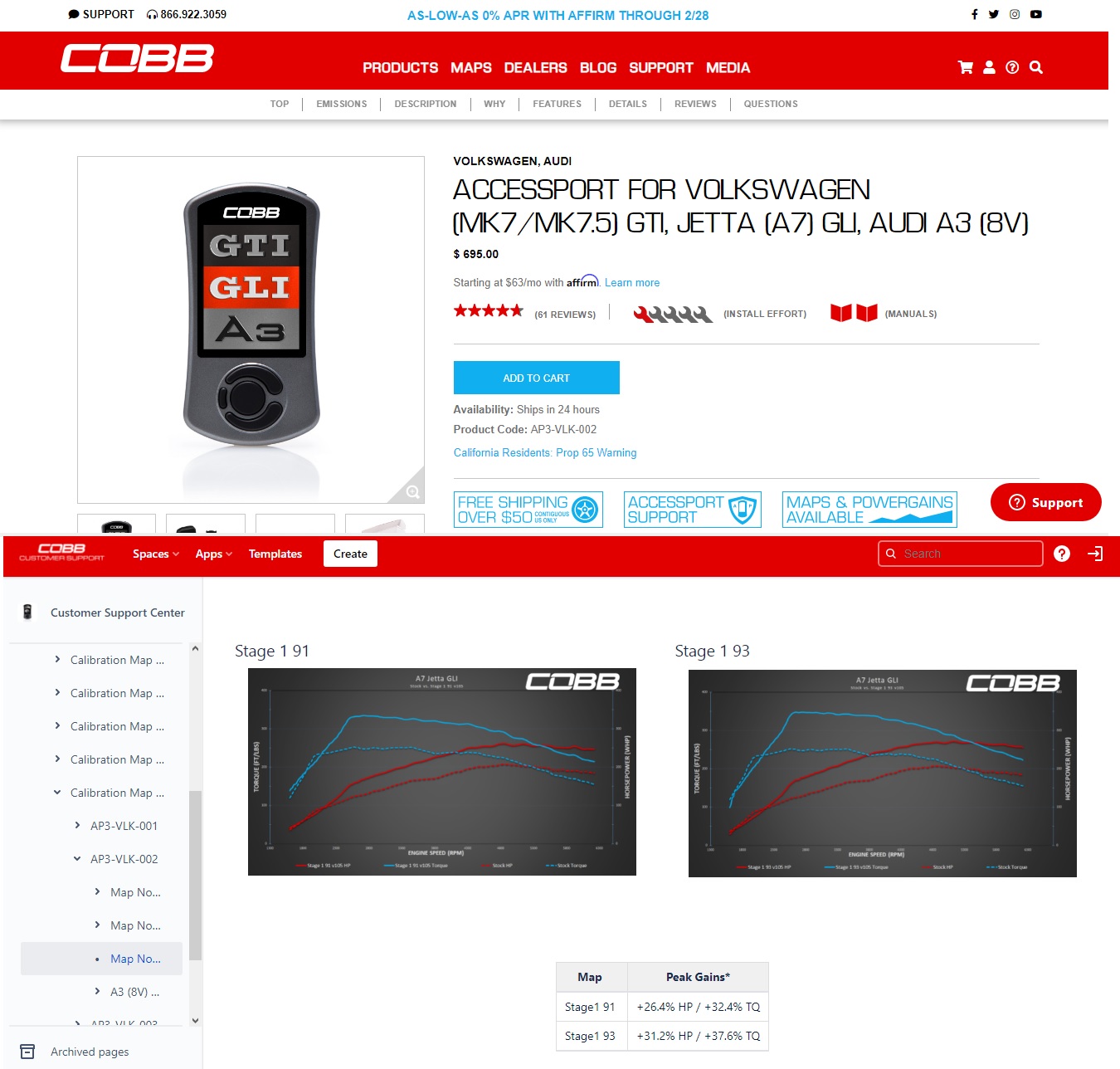
Priced at $695, it’s significantly more expensive than the EcoChip but, although they make claims of +25% or +50% power gains over stock, Cobb Tuning provides the relevant performance map notes and dyno charts to prove it.
That’s because Cobb Tuning takes actual cars, straps them on a dyno, and adjusts parameters like air, fuel, boost pressure and timing to make a customized ECU map for different stages. These maps are then loaded onto an OBD2 devices to be installed by customers.
ECU tuning is VEHICLE SPECIFIC and LABOR INTENSIVE done by ACTUAL TUNERS with results BACKED BY DATA.
Although some Cobb Tuning AccessPort tunes, like the Jetta one above, aren’t advertised as “fuel saving,” because the more powerful tunes optimize how the engine runes, making it more fuel efficient, a side effect is often slightly better MPG.
And, when Cobb Tuning does provide an Economy Mode ECU tune, it’s a vehicle specific map, like this one for a Subaru WRX STI, that can’t be made by an OBD2 device merely observing ECU data. There has to be actual R&D done prior.
EcoChip does not provide evidence of how one $45 OBD2 device works across the gamut of cars made after 1996. Supposedly, their device will optimize fuel and performance on an Acura Integra or a Rolls-Royce Ghost.
I find that claim hard to believe.
Do you actually think the $45 EcoChip is cross compatible with ECUs from different manufacturers?
Follows the same formula.
OBD2 fuel saver devices that probably don’t work often use a generic green and white OBD2 dongle case.
Check out my review on the EcoBox here and
Check out my review on the EcoTune here.
Notice anything?
As I’ve explained before, these green and white OBD2 dongles are available for wholesale from Chinese sites like AliExpress for as little as $3/piece.

Even these cheap ones make similar claims like EcoChip.
- EcoOBD2 is a Plug&Drive Ready device.
- EcoOBD2 is easy to install. Plug into the OBD2 connector of cars. EcoOBD2 fits all car from the year of 1996.
- It works based on OBD2 protocols for remapping the Car’s computer ECU.
You can probably work out how profitable a $45 EcoChip is based on what you can find from a wholesaler.
Questionable Google Search results?
OBD2 Fuel Saver devices that don’t work often pay blogs to post reviews with little merit, with copy that parrots what’s advertised on their site.
Before my blog post, here’s what comes up searching for “EcoChip reviews.” Looks on the up and up, right?

Let’s dig into the search results and see what comes up when I click on the top articles.
- The first search result is a blog post from TechTimes.com written by David Thompson titled, “Ecochip Reviews – Eco chip (Scam or Legit) Read This NOW Before Buying!” (archived here.)
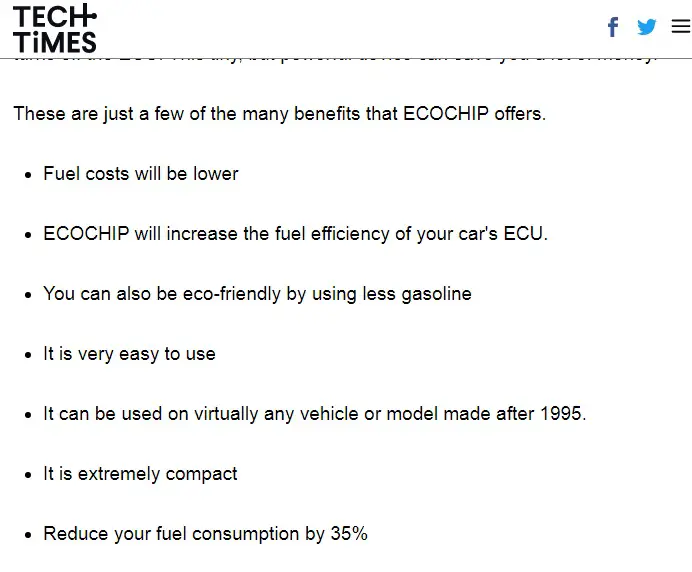
This review reads like an advertisement, does not have a hint of journalistic credibility, and there is no serious analysis of the EcoChip.
- The second search result is from Sabi Reviews written by Wendy titled, “Ecochip Fuel Saver: Is It a Scam? Here’s What We Think About It [Feb 2022]” (archived here)
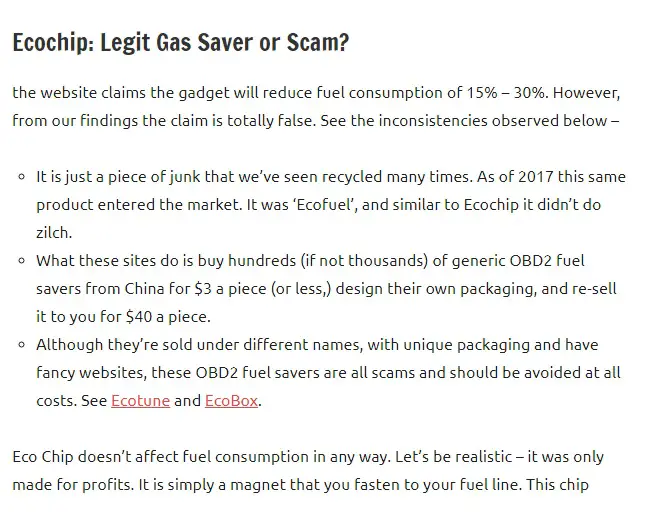
OK, this is equal parts embarrassing and angering as it looks like this site has copied large parts of my own blog post and reposted it as their own.
Regardless, at least it is not a word for word copy of GetEcoChip.com’s own website.
- The third search result is from Market Realist written by Katheryn Underwood titled “Is EcoChip a Scam? Device Has Mixed Reviews, Buy at Your Own Risk” found under their “Scams & Fraud” category of posts. Interesting! (archived here.)
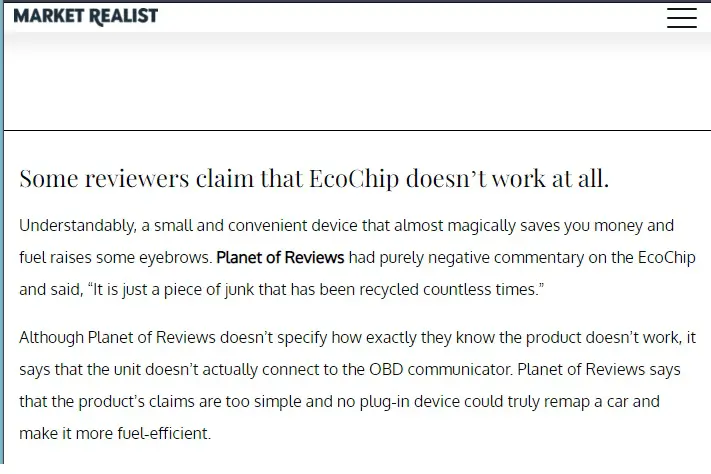
Market Realist’s post is actually decent, questioning EcoChip’s credibility. Underwood links to Planet of Reviews which concludes, “From every indication, it is clear that the EcoChip does not work, and is not recommended by us.”
- The fifth search result after Planet of Reviews is from a questionable news site called MariFimines, post titled “Is Ecochip A Scam [50% Off] Reading It Will Save Money.” (archived here)
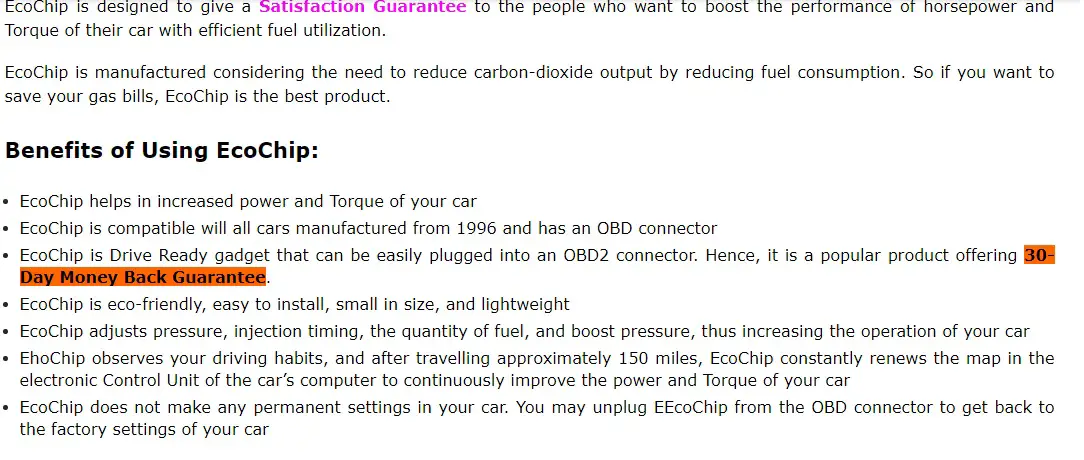
You can throw this search result out the window because it’s like the first one, it parrots whatever is said on GetEcoChip.com without any real analysis.
Conclusion
So far, EcoChip raises a lot of red flags shared by OBD2 devices that don’t work; it’s a fairly new site, does not back up its claims with data, and follows the same white/green OBD2 dongle design formula.
Surprisingly, critical reviews of the EcoChip are on page 1 of Google, with the first and fifth search result having no journalistic credibility. It’s reasonable to suspect the people behind EcoChip paid for articles, hoping they land on page 1 of Google Search results to fool people looking up EcoChip, and it worked.
Hopefully this blog post begins to outrank those paid ones.
Based on that alone, I, myself, would not spend my hard-earned money on the EcoChip.
I hope you don’t, either!


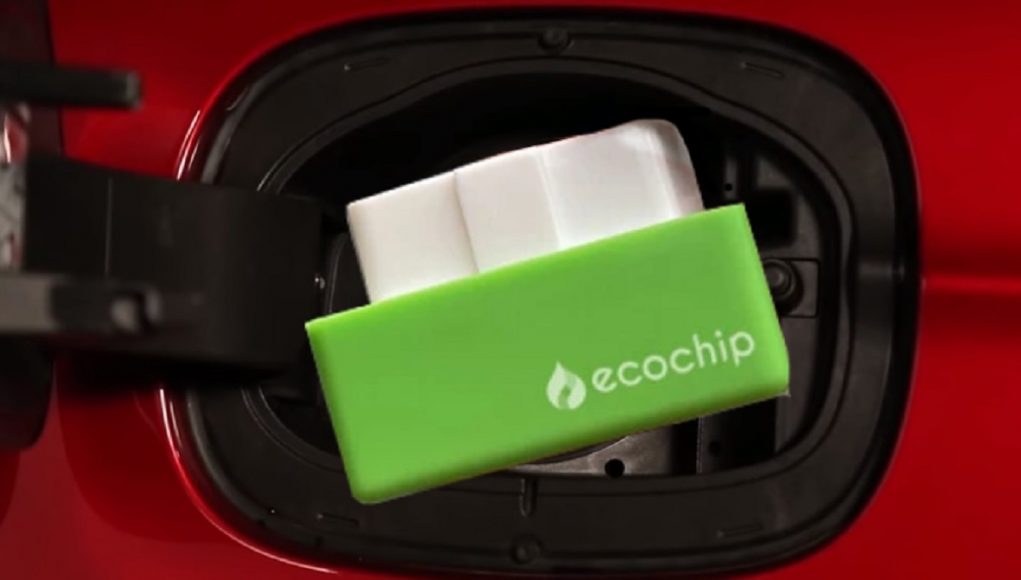

Thanks for this Paulo. It took me 30 min. to find your blog searching with two browsers and 2 different search engines. They must be paying them all the profits in order to keep the other crap rising to the top.
Thank you very much, Paulo, this is the kind of product (worthless shit) reporting that is very much needed, I hope you continue doing this, like Butch from May 7th said, your blog was difficult to find, I also appreciate the link you put in four-planet of reviews – much appreciated. Earnest